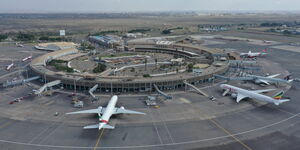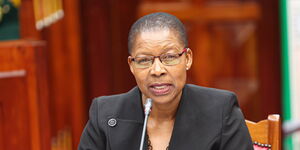Another mass exodus has been witnessed in Nairobi County, as Kenyans relocate to upcountry after the government hinted at imposing stringent measures to curb the Covid-19 pandemic.
Several passengers were spotted at the country bus station in Nairobi on Wednesday, November 4, departing with their household commodities.
The exodus commenced a few days before President Uhuru Kenyatta addressed the nation, reversing curfew period to commence from 10 p.m. to 4 a.m. and also extending it by 60 more days.
Kenyans.co.ke spoke to several bus companies in Nairobi who said that they registered mass bookings before Kenyatta's address.
A passenger detailed that he relocated upcountry as the second wave of Covid-19 may see Kenyatta lockdown several counties, with Nairobi, Mombasa and Nakuru among those targetted after witnessing spikes.
"I would rather be locked down in my home county rather than Nairobi. Life is expensive in the city and most of us lost our jobs," the passenger lamented.
Easy Coach communications office, however, stated that they had not witnessed such a trajectory, adding that their data for travellers in and out of Nairobi was average.
A Western Express representative added that the numbers were high before the President addressed the nation, with those leaving fearing being locked within Nairobi.
"For us, we offer early bookings. The numbers, however, declined just a few days before the address as those who were to travel also feared being locked out of Nairobi," the communications officer stated indicating that those who had business to handle upcountry delayed their travel booking.
In May 2020, the Ministry of Health warned Kenyans against travelling upcountry at a time when Nairobi, Mombasa, Kilifi and Kwale counties were the only ones to have recorded Covid-19 cases.
However, with 57,093 cases recorded among all 47 counties as of Wednesday, November 4, Kenyatta stated that the government would impose tough measures on any county that would witness an upsurge.
In Nairobi, several Kenyans were rendered jobless, with many opting to move in with friends to cut costs. Some sent families upcountry and breadwinners were left to make ends meet in the city.
A report by the United Nations detailed that approximately 3.5 million Kenyans slept hungry in the months between July and September 2020. A report released by Geopoll titled Financial Impact of COVID added that over 17 million Kenyans would deplete their savings by August 2020.
Many Kenyans who turned to loans are unable to offset the credits. CBK is set to allow banks to reprice borrowers risk, a move that may see Kenyans pay and take loans with higher interest rates.
Watch Kenyans depart Nairobi City
{"preview_thumbnail":"/files/styles/video_embed_wysiwyg_preview/public/video_thumbnails/_XDAcoYr56c.jpg?itok=Q7kiwr5r","video_url":"https://www.youtube.com/watch?v=_XDAcoYr56c","settings":{"responsive":1,"width":"854","height":"480","autoplay":0},"settings_summary":["Embedded Video (Responsive)."]}












